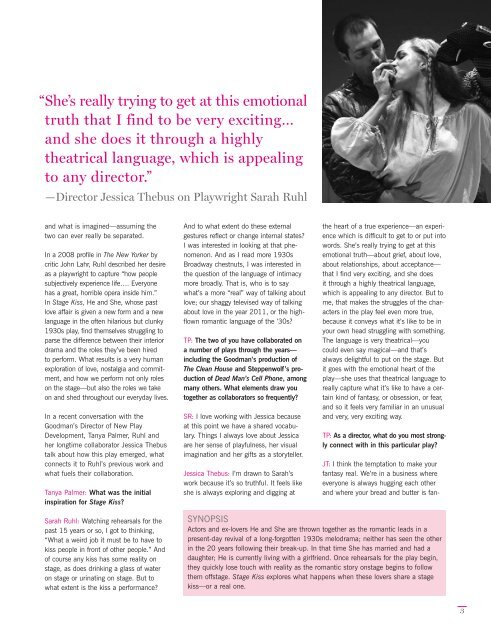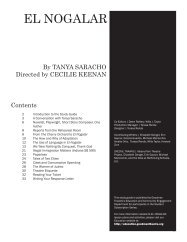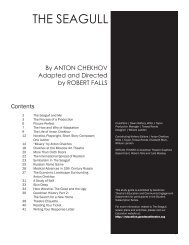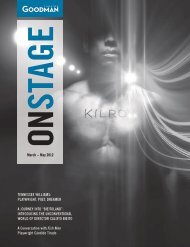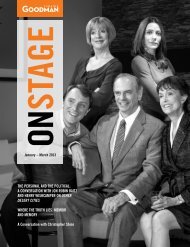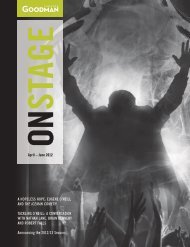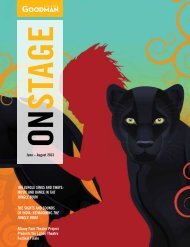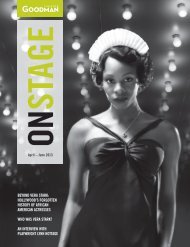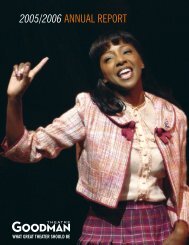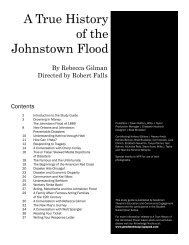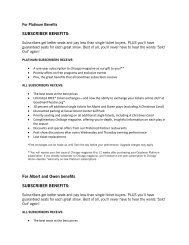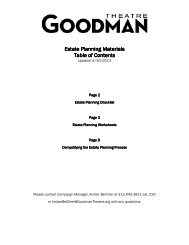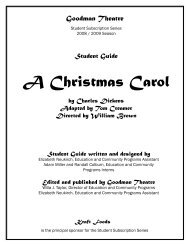Stage Kiss - Goodman Theatre
Stage Kiss - Goodman Theatre
Stage Kiss - Goodman Theatre
Create successful ePaper yourself
Turn your PDF publications into a flip-book with our unique Google optimized e-Paper software.
“She’s really trying to get at this emotional<br />
truth that I find to be very exciting…<br />
and she does it through a highly<br />
theatrical language, which is appealing<br />
to any director.”<br />
—Director Jessica Thebus on Playwright Sarah Ruhl<br />
and what is imagined—assuming the<br />
two can ever really be separated.<br />
In a 2008 profile in The New Yorker by<br />
critic John Lahr, Ruhl described her desire<br />
as a playwright to capture “how people<br />
subjectively experience life…. Everyone<br />
has a great, horrible opera inside him.”<br />
In <strong>Stage</strong> <strong>Kiss</strong>, He and She, whose past<br />
love affair is given a new form and a new<br />
language in the often hilarious but clunky<br />
1930s play, find themselves struggling to<br />
parse the difference between their interior<br />
drama and the roles they’ve been hired<br />
to perform. What results is a very human<br />
exploration of love, nostalgia and commitment,<br />
and how we perform not only roles<br />
on the stage—but also the roles we take<br />
on and shed throughout our everyday lives.<br />
In a recent conversation with the<br />
<strong>Goodman</strong>’s Director of New Play<br />
Development, Tanya Palmer, Ruhl and<br />
her longtime collaborator Jessica Thebus<br />
talk about how this play emerged, what<br />
connects it to Ruhl’s previous work and<br />
what fuels their collaboration.<br />
Tanya Palmer: What was the initial<br />
inspiration for <strong>Stage</strong> <strong>Kiss</strong>?<br />
And to what extent do these external<br />
gestures reflect or change internal states?<br />
I was interested in looking at that phenomenon.<br />
And as I read more 1930s<br />
Broadway chestnuts, I was interested in<br />
the question of the language of intimacy<br />
more broadly. That is, who is to say<br />
what’s a more “real” way of talking about<br />
love; our shaggy televised way of talking<br />
about love in the year 2011, or the highflown<br />
romantic language of the ’30s?<br />
TP: The two of you have collaborated on<br />
a number of plays through the years—<br />
including the <strong>Goodman</strong>’s production of<br />
The Clean House and Steppenwolf’s production<br />
of Dead Man’s Cell Phone, among<br />
many others. What elements draw you<br />
together as collaborators so frequently?<br />
SR: I love working with Jessica because<br />
at this point we have a shared vocabulary.<br />
Things I always love about Jessica<br />
are her sense of playfulness, her visual<br />
imagination and her gifts as a storyteller.<br />
Jessica Thebus: I’m drawn to Sarah’s<br />
work because it’s so truthful. It feels like<br />
she is always exploring and digging at<br />
the heart of a true experience—an experience<br />
which is difficult to get to or put into<br />
words. She’s really trying to get at this<br />
emotional truth—about grief, about love,<br />
about relationships, about acceptance—<br />
that I find very exciting, and she does<br />
it through a highly theatrical language,<br />
which is appealing to any director. But to<br />
me, that makes the struggles of the characters<br />
in the play feel even more true,<br />
because it conveys what it’s like to be in<br />
your own head struggling with something.<br />
The language is very theatrical—you<br />
could even say magical—and that’s<br />
always delightful to put on the stage. But<br />
it goes with the emotional heart of the<br />
play—she uses that theatrical language to<br />
really capture what it’s like to have a certain<br />
kind of fantasy, or obsession, or fear,<br />
and so it feels very familiar in an unusual<br />
and very, very exciting way.<br />
TP: As a director, what do you most strongly<br />
connect with in this particular play?<br />
JT: I think the temptation to make your<br />
fantasy real. We’re in a business where<br />
everyone is always hugging each other<br />
and where your bread and butter is fan-<br />
Sarah Ruhl: Watching rehearsals for the<br />
past 15 years or so, I got to thinking,<br />
“What a weird job it must be to have to<br />
kiss people in front of other people.” And<br />
of course any kiss has some reality on<br />
stage, as does drinking a glass of water<br />
on stage or urinating on stage. But to<br />
what extent is the kiss a performance?<br />
SYNOPSIS<br />
Actors and ex-lovers He and She are thrown together as the romantic leads in a<br />
present-day revival of a long-forgotten 1930s melodrama; neither has seen the other<br />
in the 20 years following their break-up. In that time She has married and had a<br />
daughter; He is currently living with a girlfriend. Once rehearsals for the play begin,<br />
they quickly lose touch with reality as the romantic story onstage begins to follow<br />
them offstage. <strong>Stage</strong> <strong>Kiss</strong> explores what happens when these lovers share a stage<br />
kiss—or a real one.<br />
3


